Authors: Bob Woodward
Tags: #History: American, #U.S. President, #Executive Branch, #Political Science, #Politics and government, #Iraq War; 2003, #Iraq War (2003-), #Government, #21st Century, #(George Walker);, #2001-2009, #Current Events, #United States - 21st Century, #U.S. Federal Government, #Bush; George W., #Military, #History, #1946-, #Presidents & Heads of State, #Political History, #General, #Biography & Autobiography, #Politics, #Government - Executive Branch, #United States
The War Within (66 page)
Bush and Cheney met with the Joint Chiefs at the Pentagon on December 13, 2006. The chiefs made clear that
they opposed a troop surge. It could break the military. The president had all but made up his mind, yet he
decided to hear them out. "They may have thought I was leaning, and I probably was," he said later. "But the
door wasn't shut."
General Peter Schoomaker, the Army chief of staff, worried that the Army was being stretched too thin and
told the president that a surge of five brigades would not work without extending Army tours. "These kids
just see deployments to Iraq or Afghanistan for the indefinite future," he told Bush. "I don't think you have
time to surge."
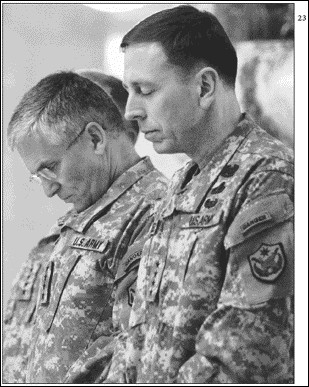

On February 10, 2007, General David Petraeus relieved Casey as the top U.S. commander in Baghdad. Casey
still wanted to turn responsibility over to the Iraqis as soon as possible. "It is going against everything that
we've been working on for the last two and a half years," he said of the new strategy.
On March 29, 2007, President Bush met privately with Nancy Pelosi, the new Democratic speaker of the
House. "Mr. President," she said, "we owe it to the public to try to reach some consensus." Bush replied, "My
views are well known. I've made myself clear."
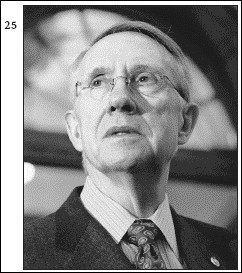
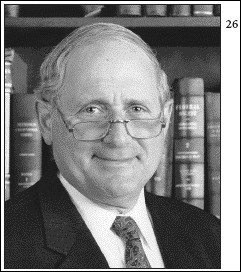
On April 19, 2007, Senate Majority Leader Harry Reid said the Iraq War "is lost." Bush later said of the
comment, "I'm not shocked by anything in Washington anymore. This war has created a lot of really harsh
emotion, out of which comes a lot of harsh rhetoric. One of my failures has been to change the tone in
Washington."
Senator Carl Levin, the chairman of the Armed Services Committee, acted as a sounding board for Defense
Secretary Gates, who wanted to know how reappointment of General Pace as JCS chairman would be
received in the Senate. "It's going to be a battle royal," Levin said. Gates soon told Pace he would have to
retire.
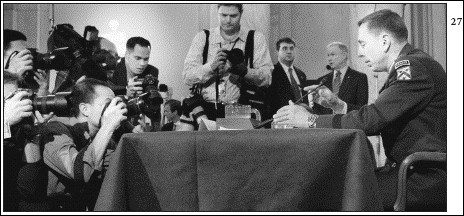

General David Petraeus, the Iraq commander, agreed to give Congress regular updates on the war. His first,
on September 10, 2007, was in the words of one commentator, "the most important testimony of any general
in 40 years." Sitting at attention for hours was so painful, Petraeus gobbled Motrin tablets during breaks. He
reported progress but tried to avoid overstatement.
As the new Central Commander, Admiral William J. Fallon questioned Petraeus's constant requests for more
manpower in Iraq. "This is nuts," he told Joint Chiefs Chairman Peter Pace. "Nobody's doing strategic
thinkingÖ. Now I understand why we are where we are. We ought to be shot for this."
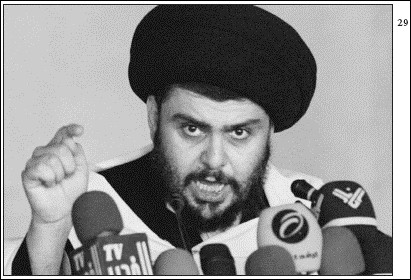
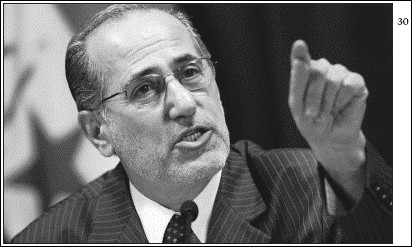
Radical Shia cleric Moqtada al-Sadr and his Mahdi Army were a powerful force in Iraq. When he ordered the
group to suspend attacks in 2007, it helped reduce the violence. In 2008, he announced the creation of a new
paramilitary unit to attack U.S. forces, but some officials thought his influence was declining as the Iraqi
government became more assertive.
Mowaffak al-Rubaie, the national security adviser to Prime Minister Maliki, frequently met with
administration officials in Washington. On May 9, 2007, as violence kept rising in Iraq, Stephen Hadley told
Rubaie, "We have to dramatize progress. We need a dramatic event."
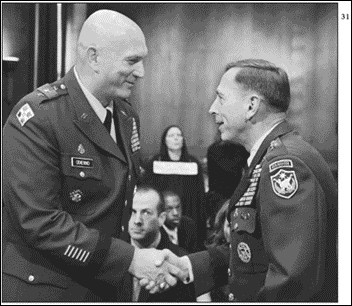
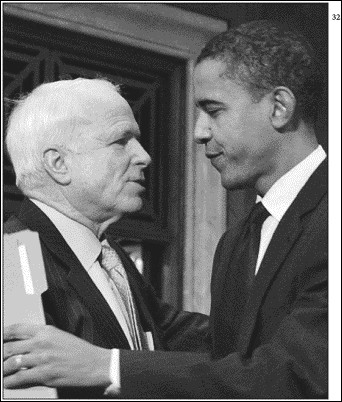
In the spring of 2008, Defense Secretary Robert Gates announced that General Raymond Odierno would
succeed Petraeus as the U.S. commander in Iraq, while Petraeus would take over as Central Commander.
Retired General Jack Keane said the appointments would lock in the current strategy. "Let's assume we have
a Democratic administration and they want to pull this thing out quickly, and now they have to deal with
General Petraeus and General Odierno," he told Gates. "There will be a price to be paid to override them."
Republican presidential nominee John McCain and Democratic nominee Barack Obama greet each other on
Capitol Hill in 2007. One of them will inherit the presidency and the Iraq War on January 20, 2009.